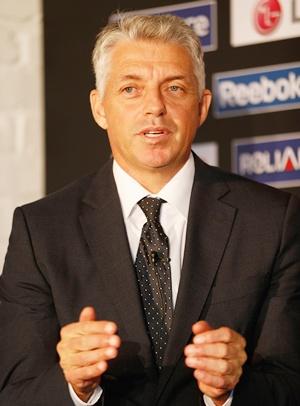 | « Back to article | Print this article |
ICC CEO Dave Richardson says that cricket's world governing body is facing a "war" against corruption right now in which "everybody is susceptible", including the curators and the groundsmen.
-ICC suspends umpires caught in sting operation
Cricket fraternity was once again left shaken when an Indian TV channel did a sting operation on umpires who were allegedly willing to give dubious decisions for money.
-Umpires caught agreeing to spot fix: TV channel
"It is everybody now unfortunately: everybody is susceptible, the curators, the groundsmen," Richardson, who took over as ICC CEO in July this year, said at the unveiling of the ICC Champions Trophy to be held in England next year.
"At international level, whether it is a bilateral series or whether it is an ICC event, the attention to that aspect of the world game is at the same level every time we walk out onto the field so to speak.
 "So it won't be any less, it won't be any more than normal. But the bottom line is, it is a bit of a war we are fighting and our anti-corruption unit has their work cut out to make sure the players are kept away from temptation and that we end up with a corruption-free event."
"So it won't be any less, it won't be any more than normal. But the bottom line is, it is a bit of a war we are fighting and our anti-corruption unit has their work cut out to make sure the players are kept away from temptation and that we end up with a corruption-free event."
Six umpires -- Nadir Shah (Bangladesh), Nadeem Ghauri and Anis Siddiqui (Pakistan), and Sagara Gallage, Maurice Winston Zilwa and Gamini Dissanayake (Sri Lanka) -- were caught on tape willing to accept money for giving favourable decisions.
All six of them denied the allegations and called the sting a fake but were still suspended by the ICC pending an investigation.
Asked how the ICC plans to tackle corruption, Richardson said, "The plan of attack is obviously we have got an anti-corruption unit (ACSU) whose resources have been increased in recent times."
Richardson said with heightened awareness among international players about the perils of corruption, the bookmakers were now targetting domestic circuit.
"So they have got more personnel working there, they have got more money allocated to do their job, their databases have been upgraded. What has happened is because the international players are well educated now and know the risks, displacement has occurred and the bookies are now targeting domestic leagues," Richardson told ESPN Cricinfo.
"So to counter that we made sure that every full-member country has its own anti-corruption unit in place and its own anti-corruption code so that what we are doing at the international level can be mirrored at the domestic level. And in doing so, we have increased the total resources available (to fight corruption)."
Richardson also defended the ACSU, the efficacy of which has been questioned after exposes by the media.
"The strategy of the anti-corruption unit has been prevention," he said.
"And this is borne out of the fact that they are not a police force. They have quite restricted investigatory powers themselves. So if that is the case, then the focus has been to try and prevent.
"In other words, let us gather intelligence, let us know who the crooked bookmakers are, let us keep them away from players, when they come near the players, let us warn the players from stay away. And only if they ignore the warnings then try and nail them (players)."
Richardson said the ACSU's job is to prevent wrongdoing and not gather headlines for carrying out the job.
"In a way, the criticism has been 'how come you have never caught anybody?' But actually it is bit like a good lawyer; he keeps you out of the court.
"He does not wait for you to get to the court and then catches you. Obviously in some case the ACSU have not prevented everything and sting operations have exposed things," he explained.
Photograph: Tom Shaw/Getty Images